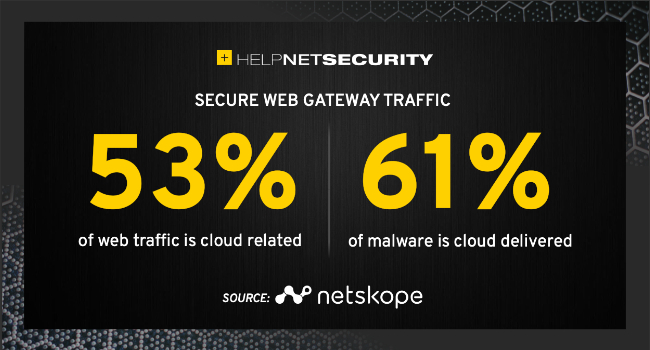Cybercriminals continue to target trusted cloud apps
The majority of all malware is now delivered via cloud applications, underscoring how attackers increasingly abuse popular cloud services to evade legacy security defenses putting enterprise data increasingly at risk, a Netskope research reveals.

“Cybercriminals increasingly abuse the most trusted and popular cloud apps, especially for cloud phishing and cloud malware delivery,” said Ray Canzanese, Threat Research Director at Netskope.
“Enterprises using the cloud need to quickly modernize and extend their security architectures to understand data content and context for apps, cloud services, and web user activity.”
Cloud use on the rise
In 2020, the number of cloud apps in use per organization increased 20%. Organizations with 500 — 2,000 employees now use on average 664 distinct cloud apps per month. Of those apps, nearly half have a “Poor” Cloud Confidence Index (CCI).
Malware delivery continues to shift into the cloud, with 61% of all malware delivered via a cloud app, up from 48% year-over-year.
Enterprise cloud apps popularity makes them a target for phishing attacks
Cloud apps are now the target of 36% of phishing campaigns. While the majority of phishing lures are still hosted on traditional websites, attackers are increasingly using cloud apps to gain footholds in organizations.
The volume of malicious Microsoft Office documents increased by 58%, as attackers are increasingly using malicious Office documents as Trojans to deliver next stage payloads, including ransomware and backdoors.
Using cloud app delivery to evade legacy email and web defenses, malicious Office documents represent 27% of all malware downloads detected and blocked.
Sensitive data in personal apps continues to grow
As work and home life continue to blend in the remote workforce, personal app instances in the enterprise increase, with 83% of users accessing personal app instances on corporate devices.
The average enterprise user uploads 20 files to personal apps each month from these managed devices. Personal app usage in the enterprise greatly increases the likelihood of data being mishandled or leaked.